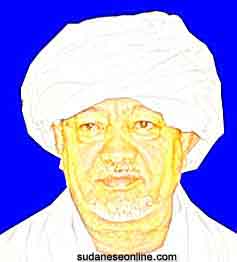| 10-08-2014, 06:58 PM |
SudaneseOnline News
 SudaneseOnline News SudaneseOnline News
Registered: 01-13-2014
Total Posts: 2165
|
|
 Sudan leader rigid, ex-media boss uncle says Sudan leader rigid, ex-media boss uncle says
|

Font size: Decrease font Enlarge font
Al-Tayeb Mustafa
Al-Tayeb Mustafa
SudaneseOnline: ШіЩҲШҜШ§ЩҶЩҠШІШ§ЩҲЩҶЩ„Ш§ЩҠЩҶ
The Daily Star
KHARTOUM: Sudanese President Omar al-Bashir uncleвҖҷs, until just days ago head of the countryвҖҷs biggest newspaper, says he has been forced out in a dispute with a вҖңmilitary dictatorship.вҖқ
вҖңI believe this regime cannot be reformed,вҖқ Al-Tayeb Mustafa, 67, a former member of BashirвҖҷs ruling National Congress Party, told AFP in an interview, adding that his relations with his nephew had soured because of their political differences.
More than seven years after founding Al-Intibaha newspaper, Mustafa says he is not writing any more columns and has resigned as chairman.
He said nobody in the ruling party was able to stand up to Bashir.
NCP leaders вҖңare following him like a goat behind its herders,вҖқ Mustafa said. вҖңThey do what he wants, and this has left him the only one who governs. He has the final decision on everything. Anyone who has a different position from him will be kicked out.вҖқ
A senior ruling party official, Rabbie Abdelatti Ebaid, rejected the accusations. He said Bashir listens to others.
вҖңHe cannot do each and every thing individually,вҖқ Ebaid said.
Although Bashir first took power in a 1989 Islamist-backed coup, his government uses the religion вҖңonly as slogans,вҖқ Mustafa says. вҖңAll Sudanese people know this. They say: вҖҳThose people are telling lies. They didnвҖҷt give us freedom. They are corrupt. And all of this is against Islam.вҖҷвҖқ
Mustafa has long been outspoken in his political views, but his comments coincide with mounting criticism of Bashir since security forces cracked down bloodily on September protests against the lifting of fuel price subsidies.
Speaking at his private office, Mustafa said those in power were worried about the growth and influence of Intibaha as well as Just Peace Forum, his political party whose views were expressed through the paper. вҖңIntibaha wasnвҖҷt afraid of the government.вҖқ
Daily circulation reached 80,000 but has dropped since Mustafa departed, he said.
State security agents ordered the newspaper closed in late September after the cash-strapped regime slashed fuel subsidies.
Intibaha had been deeply critical of the decision to cut the subsidies.
Authorities banned the daily for вҖңpolitical reasonsвҖқ but allowed it to return to the streets on Nov. 3 if he resigned as chairman, Mustafa said.
More than two years after the secession of South Sudan, war remains the major problem of the rump state that remains, Mustafa said.
вҖңThere is no freedom,вҖқ he said. вҖңThis is a military dictatorship.вҖқ
Mustafa proposes that Bashir lead a transitional government which would include other parties and technocrats ahead of transparent elections.
He described his nephew as вҖңvery close to the people,вҖқ an easy-going man in social settings. вҖңBut politically he wants to stay in power,вҖқ to protect himself from warrants issued by the International Criminal Court over alleged war crimes in Darfur, he said.
Mustafa said he asked his nephew, who was used to his uncleвҖҷs outspoken ways, to keep their political and family relations separate. That has proven difficult. вҖңNow my family relations with him are not so good,вҖқ he said.
|
|
    
|

|

|

|
|
|